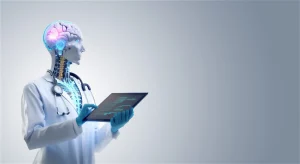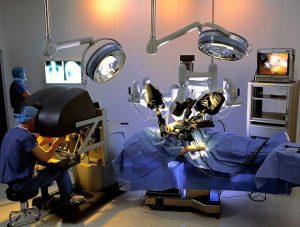The Transformative Role of AI in Healthcare: Innovations and the Future AI is making waves in the healthcare industry, fundamentally changing the way we diagnose, treat, and manage diseases. From highly accurate diagnostics to streamlined hospital operations, artificial intelligence is revolutionizing healthcare at every level. But how far have we come, and what lies ahead?
The Transformative Role of AI in Healthcare: Innovations and the Future
AI is making waves in the healthcare industry, fundamentally changing the way we diagnose, treat, and manage diseases. From highly accurate diagnostics to streamlined hospital operations, artificial intelligence is revolutionizing healthcare at every level. But how far have we come, and what lies ahead? This blog will unravel AI’s current role in healthcare, highlight groundbreaking innovations, and explore its potential for revolutionizing the field, while addressing challenges and ethical concerns.
AI in Healthcare: A Definition and Impact

Image by Yandex.com
Artificial Intelligence (AI), the simulation of human intelligence in machines, has carved its footprint in multiple industries, and healthcare is no exception. Its capacity to analyze vast amounts of data, identify patterns, and automate processes opens up extraordinary possibilities. Although the marriage of AI and healthcare dates back to simplistic computer-based systems in the late 20th century, it is only in recent years, with stronger computing power and data availability, that we have witnessed its stunning impact.
The Current State of AI in Healthcare
AI technologies are no longer experimental; they are being actively deployed to enhance patient care and operational efficiency. Here are a few key areas where AI is already making a difference:
AI in Diagnostics
AI excels in detecting diseases with accuracy akin to, or exceeding, human expertise. For instance, Google’s DeepMind has developed algorithms that rival expert radiologists in identifying breast cancer in mammograms. Similarly, AI-driven software like IDx-DR has been approved for autonomous detection of diabetic retinopathy, a leading cause of blindness.
Case Study: Streamlined Hospital Management
Hospitals like Mount Sinai in New York are leveraging AI to predict patient admissions and manage hospital resources more efficiently. By analyzing historical data, AI tools optimize how beds, staff, and equipment are allocated, resulting in improved patient care and reduced costs.
AI in Telemedicine
With the rise of telehealth, AI-powered virtual assistants are speeding up symptom checks, triaging patients, and even facilitating follow-ups. Apps like Babylon Health use AI to provide preliminary consultations, reducing the strain on healthcare providers and empowering patients.
Recent Innovations and Developments
AI is advancing healthcare innovation in unprecedented ways, pushing the boundaries of what is possible.
Medical Imaging and Diagnostics
AI-powered tools from companies like Aidoc and Zebra Medical Vision are drastically improving the accuracy and efficiency of medical imaging. These tools process images in real-time, flagging abnormalities that may otherwise go unnoticed by human eyes.
Personalized Treatment and Drug Discovery
One of AI’s most exciting contributions lies in personalized medicine. AI algorithms analyze genetic, lifestyle, and environmental data to create tailored treatment plans for individuals. Platforms like Tempus specialize in using such data to combat conditions like cancer. Similarly, AI is accelerating drug discovery; BenevolentAI has shortened the time it takes to identify viable drug candidates significantly.
Robotic-Assisted Surgery

Image by Yandex.com
Companies like Intuitive Surgical are developing advanced robotic systems controlled by AI to perform minimally invasive surgeries. These systems provide precision and reduce recovery times for patients.
The Future of AI in Healthcare
What will the next decade look like with widespread AI adoption?
Predictions
- Advanced Predictive Analytics will help detect diseases years before symptoms appear.
- Mental Health Applications will become smarter and offer real-time, customized interventions.
- AI will drive global healthcare equity by overcoming barriers to access in low-resource settings.
Challenges and Ethical Considerations
However, the path forward is not without hurdles:
- Bias in Data: AI systems rely on data, but biases in datasets can lead to inequitable outcomes.
- Regulatory Landscape: Adopting AI in critical health scenarios means comprehensive regulatory frameworks are crucial.
- Job Displacement: Will robots replace healthcare professionals? While AI can augment their roles, it also raises concerns about the displacement of human workers.
AI’s Impact on Healthcare Professionals
With advancements in AI, healthcare professionals are seeing their roles evolve.
A Support System, Not a Replacement
Contrary to fears of redundancy, AI is proving to be a powerful ally for doctors and nurses, managing administrative tasks like charting and appointment scheduling, allowing them to focus on patient care.
The New Skills Required
Healthcare professionals need to adapt by acquiring tech-related skills, such as interpreting AI-generated insights or operating robotic-assisted tools. Universities are now integrating data literacy and AI training into medical programs.
Impact on Consumers and Healthcare Systems
AI doesn’t just benefit professionals—it transforms health experiences for ordinary consumers as well.
Benefits for Patients
Patients now experience shorter waiting times and more accurate diagnoses. Wearables like Fitbit and Apple Watch track health metrics consistently, while AI analyzes the data for actionable insights.
Affordability and Accessibility
By making remote consultations and diagnostics faster and cheaper, AI improves healthcare affordability. However, ensuring equal access to these advancements remains a pressing concern.
AI Is Reshaping Healthcare—Are You Ready?
AI is not a distant future—it’s the present, opening paths to better, faster, and more efficient healthcare systems. However, with great power comes significant responsibility, and stakeholders must collaborate to address the ethical, regulatory, and implementation challenges surrounding AI.
For healthcare professionals, researchers, and innovators, now is the time to adapt and lead. Want to learn more about staying ahead in this AI-driven transformation? Delve deeper into our resources on how to integrate AI into your healthcare facility or practice, and harness its full potential.
















